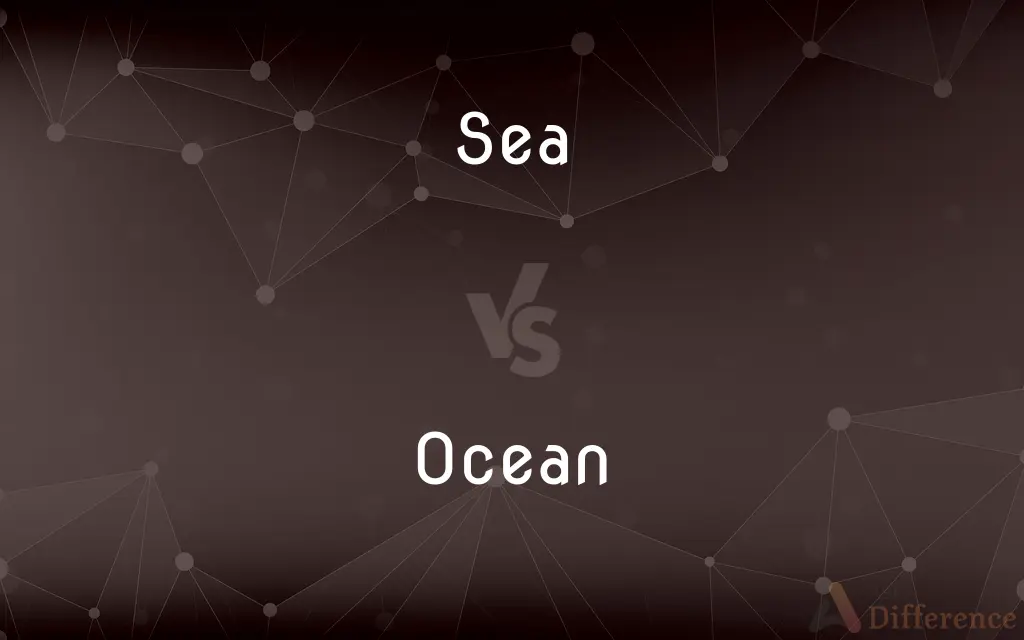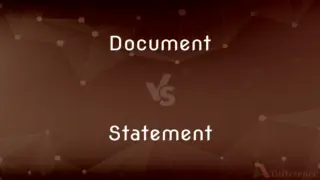Sea vs. Ocean — What's the Difference?
By Tayyaba Rehman — Updated on September 16, 2023
Seas are smaller, partially enclosed bodies of saltwater connected to oceans. Oceans are vast, deep bodies of saltwater that cover about 71% of Earth's surface.

Difference Between Sea and Ocean
Table of Contents
ADVERTISEMENT
Key Differences
A sea is a relatively smaller body of saltwater that is either partially or entirely enclosed by land. An ocean is a significantly larger, deeper body of saltwater that covers approximately 71% of Earth's surface.
Seas are generally shallower than oceans and are often connected to them. Oceans are deeper and are not enclosed by land, stretching across vast expanses and even connecting continents.
In terms of geography, seas are often specific to certain regions or countries. Oceans are more expansive, separating continents and embracing multiple countries and even hemispheres.
Grammatically speaking, both "sea" and "ocean" serve primarily as nouns. While "sea" can sometimes be used as an adjective in expressions like "sea level," "ocean" is less frequently used as an adjective, such as in "ocean current."
In literature and symbolism, the sea often represents mystery, emotion, or a journey. The ocean, being far more expansive, often symbolizes the unknown, infinity, or overwhelming power.
ADVERTISEMENT
Comparison Chart
Size
Smaller
Larger
Depth
Generally shallower
Generally deeper
Enclosure
Partially by land
Not enclosed
Geographic Scope
Region-specific
Global
Symbolism
Journey, emotion
Unknown, infinity
Compare with Definitions
Sea
A smaller body of saltwater partially enclosed by land.
The Mediterranean Sea is surrounded by Europe, Asia, and Africa.
Ocean
A vast, deep body of saltwater covering about 71% of Earth's surface.
The Atlantic Ocean separates North America and Europe.
Sea
Generally shallower than oceans.
The sea near the beach was shallow enough to wade in.
Ocean
Primarily serves as a noun.
Ocean currents influence climate.
Sea
Specific to certain regions or countries.
The Baltic Sea is in Northern Europe.
Ocean
Separates continents and spans hemispheres.
The Indian Ocean is shared by Asia, Africa, and Australia.
Sea
The sea, connected as the world ocean or simply the ocean, is the body of salty water that covers approximately 71 percent of the Earth's surface. The word sea is also used to denote second-order sections of the sea, such as the Mediterranean Sea, as well as certain large, entirely landlocked, saltwater lakes, such as the Caspian Sea.
Ocean
The ocean (also the sea or the world ocean) is the body of salt water which covers approximately 71% of the surface of the Earth and contains 97% of Earth's water. Another definition is "any of the large bodies of water into which the great ocean is divided".
Sea
The continuous body of salt water covering most of the earth's surface, especially this body regarded as a geophysical entity distinct from earth and sky.
Ocean
The entire body of salt water that covers more than 70 percent of the earth's surface.
Sea
A tract of water within an ocean.
Ocean
Abbr. Oc. or O. Any of the principal divisions of the ocean, including the Atlantic, Pacific, Indian, Arctic, and Southern Oceans.
Sea
A relatively large body of salt water completely or partially enclosed by land.
Ocean
A great expanse or amount
"that ocean of land which is Russia" (Henry A. Kissinger).
Sea
A relatively large landlocked body of fresh water.
Ocean
(countable) One of the large bodies of water separating the continents.
Sea
The condition of the ocean's surface with regard to its course, flow, swell, or turbulence
A rising sea.
Choppy seas.
Ocean
(uncountable) Water belonging to an ocean.
The island is surrounded by ocean
Sea
A wave or swell, especially a large one
A 40-foot sea that broke over the stern.
Ocean
(figuratively) An immense expanse; any vast space or quantity without apparent limits.
The boundless ocean of eternity
An ocean of difference
Sea
Something that suggests the ocean in its overwhelming sweep or vastness
A sea of controversy.
Ocean
A blue colour, like that of the ocean (also called ocean blue).
Sea
Seafaring as a way of life.
Ocean
The whole body of salt water which covers more than three fifths of the surface of the globe; - called also the sea, or great sea.
Like the odor of brine from the oceanComes the thought of other years.
Sea
(Astronomy) A lunar mare.
Ocean
One of the large bodies of water into which the great ocean is regarded as divided, as the Atlantic, Pacific, Indian, Arctic and Antarctic oceans.
Sea
A large body of salt water.
Ocean
An immense expanse; any vast space or quantity without apparent limits; as, the boundless ocean of eternity; an ocean of affairs.
You're gonna need an oceanOf calamine lotion.
Sea
The ocean; the continuous body of salt water covering a majority of the Earth's surface.
Ocean
Of or pertaining to the main or great sea; as, the ocean waves; an ocean stream.
Sea
A body of salt water smaller than an ocean, generally forming part of, or connecting with, an ocean or a larger sea.
The Mediterranean Sea, the Caribbean Sea, the Sea of Crete, etc.
Ocean
A large body of water constituting a principal part of the hydrosphere
Sea
A lake, especially if large or if salty or brackish.
The Caspian Sea, the Sea of Galilee, the Salton Sea, etc.
Ocean
Anything apparently limitless in quantity or volume
Sea
The swell of the sea; a single wave; billow.
Ocean
Not enclosed by land and stretches across continents.
The Pacific Ocean is the world's largest ocean.
Sea
Living or used in or on the sea; of, near, or like the sea.
Seaman, sea gauge, sea monster, sea horse, sea level, seaworthy, seaport, seaboard, etc.
Ocean
Generally deeper and more expansive than seas.
The ocean floor contains many unexplored areas.
Sea
(figurative) Anything resembling the vastness or turbulence of the sea.
Sea
(physics) A constant flux of gluons splitting into quarks, which annihilate to produce further gluons.
Sea
(planetology) A large, dark plain of rock; a mare.
The Apollo 11 mission landed in the Sea of Tranquility.
Sea
(planetology) A very large lake of liquid hydrocarbon.
Sea
One of the larger bodies of salt water, less than an ocean, found on the earth's surface; a body of salt water of second rank, generally forming part of, or connecting with, an ocean or a larger sea; as, the Mediterranean Sea; the Sea of Marmora; the North Sea; the Carribean Sea.
Sea
An inland body of water, esp. if large or if salt or brackish; as, the Caspian Sea; the Sea of Aral; sometimes, a small fresh-water lake; as, the Sea of Galilee.
Sea
The ocean; the whole body of the salt water which covers a large part of the globe.
I marvel how the fishes live in the sea.
Ambiguous between sea and landThe river horse and scaly crocodile.
Sea
The swell of the ocean or other body of water in a high wind; motion or agitation of the water's surface; also, a single wave; a billow; as, there was a high sea after the storm; the vessel shipped a sea.
Sea
A great brazen laver in the temple at Jerusalem; - so called from its size.
He made a molten sea of ten cubits from brim to brim, round in compass, and five cubits the height thereof.
Sea
Fig.: Anything resembling the sea in vastness; as, a sea of glory.
All the space . . . was one sea of heads.
Sea
A division of an ocean or a large body of salt water partially enclosed by land
Sea
Anything apparently limitless in quantity or volume
Sea
Turbulent water with swells of considerable size;
Heavy seas
Sea
Relating to or characteristic of or occurring on the sea or ships;
Sea stories
Sea smells
Sea traffic
Land vehicles
Sea
Often connected to a larger body of water, like an ocean.
The Red Sea connects to the Indian Ocean.
Sea
Can serve as a noun or sometimes an adjective.
Sea level is rising due to climate change.
Common Curiosities
How deep are oceans?
Oceans can be very deep, with an average depth of about 12,080 feet.
How deep are seas generally?
Seas are generally shallower than oceans.
What is a sea?
A sea is a smaller, shallower body of saltwater, often partially enclosed by land.
What is an ocean?
An ocean is a large, deep body of saltwater that covers about 71% of Earth's surface.
What's the plural of sea?
The plural of sea is "seas."
Is the term "ocean" used as an adjective?
Less commonly, but it can be, as in "ocean current."
Are seas enclosed by land?
Seas are often partially enclosed by land.
Do seas connect to oceans?
Yes, seas often connect to oceans.
Which is bigger, a sea or an ocean?
An ocean is significantly larger and deeper than a sea.
Do oceans connect to seas?
Yes, oceans can connect to seas but are more expansive.
What's the plural of ocean?
The plural of ocean is "oceans."
Do seas have symbolic meanings?
Yes, in literature and symbolism, seas often represent mystery or a journey.
Are oceans enclosed by land?
No, oceans are not enclosed by land.
Is the term "sea" used as an adjective?
Yes, "sea" can sometimes serve as an adjective, as in "sea level."
Do oceans have symbolic meanings?
Yes, oceans often symbolize the unknown or infinity.
Share Your Discovery

Previous Comparison
Cherub vs. Angel
Next Comparison
Document vs. StatementAuthor Spotlight
Written by
Tayyaba RehmanTayyaba Rehman is a distinguished writer, currently serving as a primary contributor to askdifference.com. As a researcher in semantics and etymology, Tayyaba's passion for the complexity of languages and their distinctions has found a perfect home on the platform. Tayyaba delves into the intricacies of language, distinguishing between commonly confused words and phrases, thereby providing clarity for readers worldwide.














































